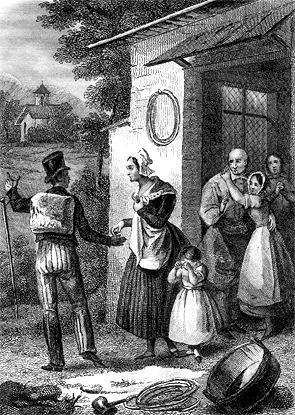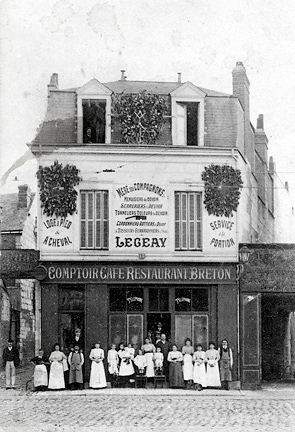Le tour de France
Once they had become guild members, these young men could set off on their travels— their Tour de France—aided by a network of places to stay, inns and taverns kept by the “Fathers” and “Mothers”. When they reached a city, other guild members (the “Rollers”) then took charge of finding them a job; otherwise, they continued on their way, provided with stipends for their journeys.
The Tour de France generally followed the course of major rivers and the coastlines, sometimes involving a detour if guild members of a certain trade had established a centre somewhere else. Paris, Orleans, Chartres, Le Mans, Blois, Tours, Saumur, Angers, Nantes, La Rochelle, Fontenay-le-Comte, Angoulême, Rochefort, Bordeaux, Toulouse, Montauban, Béziers, Nîmes, Avignon, Marseilles, Vienne, Lyons, Beaune, Dijon, Troyes, Auxerre and Sens were cities of “passage”. Depending on period and society, other cities were designated as “Seats” – Poitiers, Niort, Thiers, Nogent-en-Bassigny, Autun, Carcassonne, Valence, Amboise, Limoges, Nevers, Mâcon, Châlon-sur-Saône, Amiens, Saint-Etienne and Elbeuf among others.
With a few exceptions relating to a particular activity in a particular place (cutlery factories at Thiers and Nogent, or the silk factories of Elbeuf and Amiens), the Seats of guild societies were situated in northern France, the other side of a line which passed from Nantes through Laval, Le Mans, Chartres and Paris, and, to the east, beyond Troyes, Mâcon, Beaune, Dijon, Lyons and neighbouring cities on the Rhône. No guilds were active in the provinces of Brittany, Normandy, Picardy, Flanders, Franche-Comté, Lorraine, Alsace or the Alpine area, nor were they established in Limousin, Auvergne, Quercy, Rouergue or, south of the Garonne, in Landes or the Pyrenees area.
This is not to say that there were no guild members from areas where guilds were not installed. On the contrary, many left their native regions to do the Tour de France; this, however, first required affiliation with a society located outside their provinces.
How long the Tour de France lasted varied considerably. It might last two, three, five or seven years, or even longer, depending on individual guild members—on their taste for independence, the pleasure taken in their “Regions” or “Coteries”, the absence of family ties, etc. The length of time spent in each city also depended, of course, on what work was available in the workshops or on the size of worksites. Whether he travelled on foot, in 30- or 40-kilometre stages, by horse-drawn carriage or by boat (horse-drawn barge), determined how slowly or quickly a “Companion” was able to get from one place to another.

In most societies, a member who settled down after having found stable employment, or who married or wished to work for himself, was obliged to “thank” the society. This meant that he was forced to leave, free of all further obligations to the society. No longer owing the society anything, he ceased to pay his subscriptions (contributions to the “tin” from which funds for emergency use were withdrawn) and no longer participated in the active life of the society (voting, finding employment, undergoing sanctions, or participating in social events). Likewise, the society ceased to have obligations towards him in cases of work accidents, job loss or other difficulties. This, however, did not mean that all ties were severed; he maintained certain “moral links” with the society in the form of memories, and had a natural tendency to defend the society and to encourage young people to join it.
From the second half of the 19th century, “thanking the guild” tended to disappear and “Companions” to continue, even when married, aged or self-employed, to participate in the activities of their society, or to form organisations of veteran guild members.
Today, guilds are no longer societies of young, self-administrating wage-earners, as was the case in the past, but are rather “mixed” societies composed of employees and employers. The “itinerants”—apprentices, aspirants, and young people on the Tour—are now supported both by their comrades on the Tour and by sedentary guild members, as well as others not holding the title of “Companion” at all (secretaries, training-programme directors, accountants, librarians, etc.).

